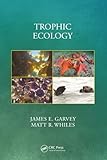Trophic ecology / James E. Garvey, Matt R. Whiles
Por: Garvey, James E [autor].
Whiles, Matt R [autor].
Tipo de material: Libro
impreso(a)
Editor: Boca Raton, Florida, United States of America: CRC Press Taylor & Francis Group, c2017Descripción: xiii, 379 páginas : fotografías, mapas ; 24 centímetros.Tipo de contenido: Texto Tipo de medio: Sin medio Tipo de portador: VolumenISBN: 1498758460; 9781498758468.Tema(s): Cadenas de alimentación (Ecología)
Libro
impreso(a)
Editor: Boca Raton, Florida, United States of America: CRC Press Taylor & Francis Group, c2017Descripción: xiii, 379 páginas : fotografías, mapas ; 24 centímetros.Tipo de contenido: Texto Tipo de medio: Sin medio Tipo de portador: VolumenISBN: 1498758460; 9781498758468.Tema(s): Cadenas de alimentación (Ecología)| Tipo de ítem | Biblioteca actual | Colección | Signatura | Estado | Fecha de vencimiento | Código de barras |
|---|---|---|---|---|---|---|
| Libros |
Biblioteca Tapachula
Texto colocado en la configuración de la biblioteca Tapachula |
Acervo General | 577.16 G3 | Disponible | ECO020013875 |
Incluye bibliografía: páginas 335-369 e índice: páginas 371-379
Glosario: páginas 329-333
Preface.. Authors.. Chapter 1. Introduction and History of Trophic Ecology Concepts and Patterns.. Section I Concepts and Patterns.. Chapter 2. Trophic Pyramids and Trophic Levels.. Chapter 3. Scavenging and Decomposition Mechanisms at the organismal Scale.. Section II Mechanisms at the Organismal Scale.. Chapter 4. Foraging in Patches.. Chapter 5. Predation.. Chapter 6. Prey Diet Data, Modeling, and Energetics Approaches.. Section III: Diet Data, Modeling, and Energetics Approaches.. Chapter 7. Analyzing Diets.. Chapter 8. Bioenergetics, Ecosystem Metabolism, and Metabolic Theory.. Chapter 9. Consumption and Nutrition Community and ecosystem concepts.. Section IV Community and Ecosystem Concepts.. Chapter 10. Food Webs.. Chapter 11. Secondary Production Quantifying Material Flux and Synthesis.. Section V Quantifying Material Flux and Synthesis.. Chapter 12. Nutrient Dynamics and Stoichiometry.. Chapter 13. Elements and Isotopes as Tracers.. Chapter 14. Use and Importance of Lipids in Trophic Ecology.. Chapter 15. Synthesis for Trophic Ecology
This book is a bridge between ecological paradigms - organismal/community approaches to food web dynamics and ecosystem-level approaches to production. The unification of organismal, community, and ecosystem approaches in ecology is emerging due to the growing availability of new techniques for assessing trophic interactions and their implications for ecosystems. Trophic Ecology is a formal text for both newcomers to the discipline as well as seasoned professionals looking for new ideas and refreshers on old topics. A wide range of topics are explained including autotrophy, heterotrophy, omnivory, decomposition, foraging behavior and theory, trophic cascades, bioenergetics, and production. The audience is upper-level undergraduate students and entry-level graduate students interested in autecological, organismal approaches to ecology, community and ecosystem ecology. It is also a reference text for instructors teaching upper-division courses, providing examples from the literature, quantitative approaches to teach, and new hypotheses yet to be fully tested by ecologists. eng
